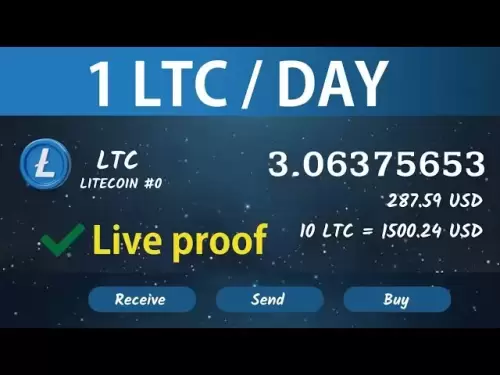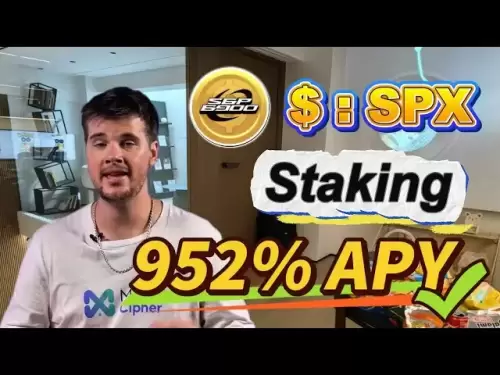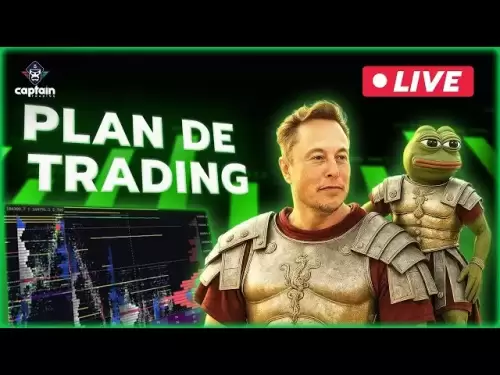-
 Bitcoin
Bitcoin $118900
0.42% -
 Ethereum
Ethereum $3710
-2.88% -
 XRP
XRP $3.513
-2.96% -
 Tether USDt
Tether USDt $1.000
-0.01% -
 Solana
Solana $203.0
3.65% -
 BNB
BNB $765.5
-1.29% -
 USDC
USDC $0.9998
0.00% -
 Dogecoin
Dogecoin $0.2671
-4.18% -
 Cardano
Cardano $0.8817
-3.63% -
 TRON
TRON $0.3139
-0.64% -
 Hyperliquid
Hyperliquid $44.34
-5.45% -
 Stellar
Stellar $0.4637
-4.08% -
 Sui
Sui $3.908
-2.59% -
 Chainlink
Chainlink $19.34
-2.62% -
 Hedera
Hedera $0.2712
-3.77% -
 Avalanche
Avalanche $24.97
-4.13% -
 Bitcoin Cash
Bitcoin Cash $519.8
-1.48% -
 Shiba Inu
Shiba Inu $0.00001518
-3.74% -
 Litecoin
Litecoin $115.6
-2.21% -
 Toncoin
Toncoin $3.460
3.68% -
 UNUS SED LEO
UNUS SED LEO $8.977
-0.07% -
 Polkadot
Polkadot $4.460
-2.96% -
 Uniswap
Uniswap $10.53
-5.43% -
 Ethena USDe
Ethena USDe $1.001
0.01% -
 Monero
Monero $323.6
-0.36% -
 Pepe
Pepe $0.00001379
-2.60% -
 Bitget Token
Bitget Token $4.772
-3.90% -
 Dai
Dai $0.9999
0.00% -
 Aave
Aave $307.5
-6.66% -
 Bittensor
Bittensor $441.8
0.84%
Why has my BNB sell order not been executed?
BNB sell order execution can be affected by order type, market liquidity, exchange issues, order book dynamics, and price movements; understanding these helps manage trading strategies.
Apr 20, 2025 at 11:35 am
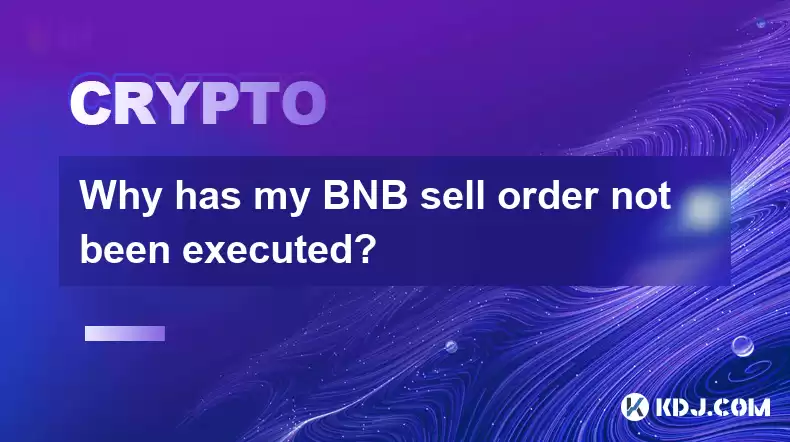
Understanding BNB Sell Order Execution
When you place a sell order for Binance Coin (BNB), you expect it to be executed promptly. However, there are several reasons why your BNB sell order may not be executed as expected. Understanding these factors can help you manage your trading strategies more effectively.
Types of Sell Orders
There are different types of sell orders that you can place on a cryptocurrency exchange, and each type has its own execution rules. Market orders are designed to be executed immediately at the current market price, while limit orders are executed only when the market reaches a specific price that you set. Stop orders are triggered when the price reaches a certain level, and then they turn into market orders.
- Market Order: This type of order is usually executed immediately, but if the market is highly volatile or there is low liquidity, the order might not be filled at the exact price you see when placing the order.
- Limit Order: If you place a limit order to sell BNB at a price higher than the current market price, it will only be executed if the market reaches that price. If the market never reaches your specified price, your order will not be executed.
- Stop Order: A stop order to sell BNB will be triggered when the price falls to your specified stop price, and then it will be executed as a market order. If the market moves rapidly, the execution price might be different from your stop price.
Market Liquidity and Order Execution
Market liquidity plays a crucial role in the execution of your BNB sell order. If the market for BNB is not liquid enough, there might not be enough buyers at your specified price to fill your order. This is particularly relevant for limit orders, where your order will sit in the order book until it can be matched with a buyer.
- If you place a sell order at a price that is significantly higher than the current market price, there might not be enough buyers willing to purchase BNB at that price, causing your order to remain unfilled.
- During times of low trading volume, even market orders might take longer to be fully executed, as there are fewer participants in the market.
Exchange Technical Issues
Technical issues on the exchange platform can also prevent your BNB sell order from being executed. These issues can range from server overloads to software bugs.
- If the exchange is experiencing high traffic, your order might be delayed or queued, leading to slower execution times.
- In some cases, the exchange might be undergoing maintenance or facing technical difficulties, which can prevent orders from being processed in a timely manner.
Order Book Dynamics
The dynamics of the order book can also impact the execution of your BNB sell order. The order book shows all the buy and sell orders currently placed on the exchange, and it can change rapidly.
- If there are many sell orders at or near your specified price, your order might be pushed further back in the queue, reducing the likelihood of immediate execution.
- Conversely, if there are many buy orders at or above your specified price, your order is more likely to be executed quickly.
Price Movements and Order Execution
Price movements in the BNB market can also affect the execution of your sell order. If the price is moving rapidly, your order might be executed at a different price than you expected, particularly if it is a market or stop order.
- For a limit order, if the price moves away from your specified price, your order will remain unfilled until the price returns to your level.
- For a market order, rapid price movements can result in your order being filled at a less favorable price than you anticipated.
Frequently Asked Questions
Q: Can I cancel my BNB sell order if it hasn't been executed yet?
A: Yes, you can cancel your BNB sell order at any time before it is executed. To do this, go to the trading interface of your exchange, find your open orders, and select the option to cancel the specific order.
Q: How can I check the status of my BNB sell order?
A: To check the status of your BNB sell order, navigate to the trading interface of your exchange, and look for the section labeled "Open Orders" or "Order History." Here, you will see all your active and completed orders, including the status of each.
Q: Will my BNB sell order be executed if the market is closed?
A: Most cryptocurrency exchanges operate 24/7, so there is no concept of a "closed market" in the traditional sense. However, if the exchange is undergoing scheduled maintenance, your order might not be executed until the maintenance is complete.
Q: What should I do if my BNB sell order is not executed due to low liquidity?
A: If your BNB sell order is not executed due to low liquidity, you can consider adjusting your order price to be closer to the current market price, which might increase the chances of execution. Alternatively, you can wait for higher market liquidity, which might occur during peak trading hours.
Disclaimer:info@kdj.com
The information provided is not trading advice. kdj.com does not assume any responsibility for any investments made based on the information provided in this article. Cryptocurrencies are highly volatile and it is highly recommended that you invest with caution after thorough research!
If you believe that the content used on this website infringes your copyright, please contact us immediately (info@kdj.com) and we will delete it promptly.
- SEC, Bitcoin, and Crypto: Navigating the Wild West of Digital Finance
- 2025-07-23 04:30:12
- Tyre Legalities, the 20p Test, and Expert Advice: Staying Safe on the Road
- 2025-07-23 04:50:12
- Liberty Head Double Eagle Proofs: A Golden Opportunity?
- 2025-07-23 04:55:12
- Solana NFTs Surge: Riding the Wave of Market Volume and NFT Hype
- 2025-07-23 04:30:12
- Stablecoin Market, US Treasuries, and Financial Risk: A Deep Dive
- 2025-07-23 05:00:13
- Wall Street Pepe (WEPE) and the Solana Meme Coin Mania: A New Era?
- 2025-07-23 03:30:13
Related knowledge

What is Chainlink (LINK)?
Jul 22,2025 at 02:14am
Understanding Chainlink (LINK): The Decentralized Oracle NetworkChainlink is a decentralized oracle network designed to bridge the gap between blockch...

What is Avalanche (AVAX)?
Jul 22,2025 at 08:35am
What is Avalanche (AVAX)?Avalanche (AVAX) is a decentralized, open-source blockchain platform designed to support high-performance decentralized appli...

What is Polkadot (DOT)?
Jul 19,2025 at 06:35pm
Understanding the Basics of Polkadot (DOT)Polkadot (DOT) is a multi-chain network protocol designed to enable different blockchains to transfer messag...

What is Monero (XMR)?
Jul 21,2025 at 10:07am
What is Monero (XMR)?Monero (XMR) is a decentralized cryptocurrency designed to provide enhanced privacy and anonymity for its users. Unlike Bitcoin a...

How to add indicators to Ethereum chart on TradingView?
Jul 19,2025 at 07:15am
What Is an Ethereum Chart on TradingView?The Ethereum chart on TradingView is a visual representation of the price movement of Ethereum (ETH) over a s...
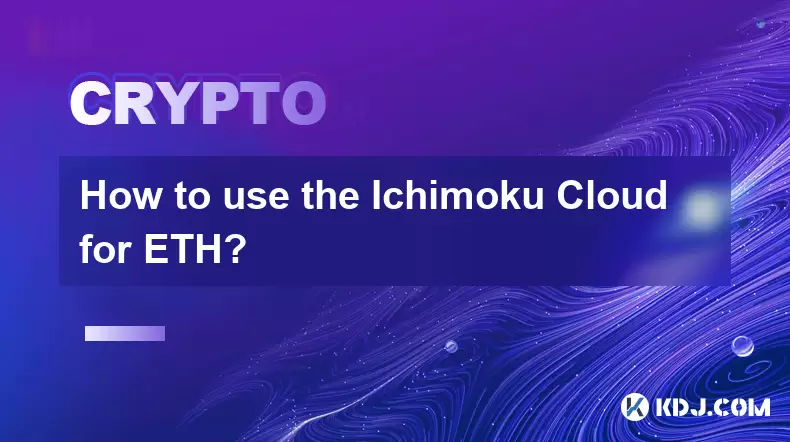
How to use the Ichimoku Cloud for ETH?
Jul 18,2025 at 09:56pm
Understanding the Ichimoku Cloud and Its ComponentsThe Ichimoku Cloud, also known as Ichimoku Kinko Hyo, is a versatile technical analysis tool that p...

What is Chainlink (LINK)?
Jul 22,2025 at 02:14am
Understanding Chainlink (LINK): The Decentralized Oracle NetworkChainlink is a decentralized oracle network designed to bridge the gap between blockch...

What is Avalanche (AVAX)?
Jul 22,2025 at 08:35am
What is Avalanche (AVAX)?Avalanche (AVAX) is a decentralized, open-source blockchain platform designed to support high-performance decentralized appli...

What is Polkadot (DOT)?
Jul 19,2025 at 06:35pm
Understanding the Basics of Polkadot (DOT)Polkadot (DOT) is a multi-chain network protocol designed to enable different blockchains to transfer messag...

What is Monero (XMR)?
Jul 21,2025 at 10:07am
What is Monero (XMR)?Monero (XMR) is a decentralized cryptocurrency designed to provide enhanced privacy and anonymity for its users. Unlike Bitcoin a...

How to add indicators to Ethereum chart on TradingView?
Jul 19,2025 at 07:15am
What Is an Ethereum Chart on TradingView?The Ethereum chart on TradingView is a visual representation of the price movement of Ethereum (ETH) over a s...

How to use the Ichimoku Cloud for ETH?
Jul 18,2025 at 09:56pm
Understanding the Ichimoku Cloud and Its ComponentsThe Ichimoku Cloud, also known as Ichimoku Kinko Hyo, is a versatile technical analysis tool that p...
See all articles























